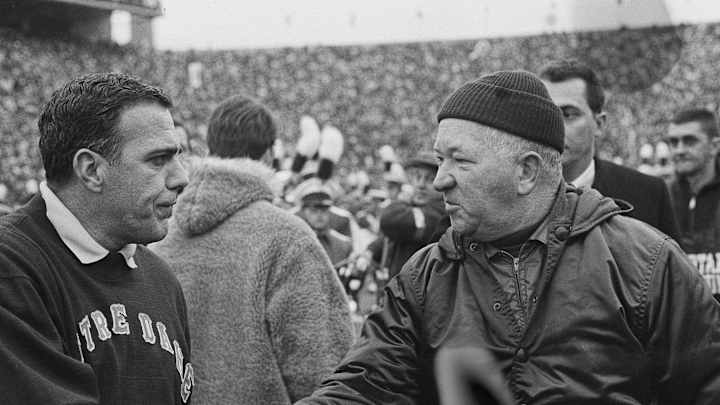Michigan State-Notre Dame highlight memorable college ties

SOUTH BEND, Ind. (AP) Ara Parseghian still bristles 50 years later at the notion No. 1 Notre Dame played for a tie against No. 2 Michigan State in one of the most famous games in college football history.
''The only play that we ran that would be suggestive of going for a tie was the last play of the game,'' the 93-year-old coaching great said.
The Irish were without their top running back, quarterback Terry Hanratty had a separated shoulder after being hit by defensive lineman Bubba Smith, several other players were injured and backup quarterback Coley O'Brien was ailing. Notre Dame didn't throw a pass in the final six plays and ran a quarterback sneak on the final play, leading to criticism of Parseghian.
The Irish, who beat No. 10 USC 51-0 a week later, were named national champions by The Associated Press and in the coaches' poll, while the Spartans, whose season was over, finished No. 2. Michigan State was declared national champions by others.
It's been 21 years since college football had its last tie, so today's players and many fans might wonder how any game that ended without resolution could be so memorable. But they are. And they served as linchpins in many an argument over who was best, too.
That 1966 game has been described as the Game of the Century, as was another Notre Dame tie , a 0-0 game between top-rated Army and the second-ranked Irish at Yankee Stadium in 1946. The Irish finished No. 1 both times while their undefeated opponent finished No. 2 in the AP poll - the only two times that's happened. In 1953, top-ranked Notre Dame fell to No. 2 following a 14-14 tie with No. 20 Iowa in a game where two players were accused of faking injuries to stop the clock at the end of both halves to score. Maryland won the title that season with the Irish No. 2.
Other famous ties include fourth-ranked Michigan tying No. 1 Ohio State 10-10 in 1973, No. 1 Texas holding on for a 15-15 tie with No. 3 Oklahoma in 1984 and a game in 1968 that led the Harvard school newspaper to run the famous headline ''Harvard Beats Yale 29-29.''
''Without an outcome, the debate of who the better team was lasts forever,'' said Kent Stephens, historian at the College Football Hall of Fame. ''The teams will always debate who was better Michigan State or Notre Dame? It's a question that remains in some people's minds unresolved.''
Most of today's players weren't alive when the last tie was played and find a game with national championship implications ending without a winner incomprehensible.
''I couldn't imagine that,'' Michigan State linebacker Riley Bullough said. ''I think the fans would be even more upset probably than the players, because they're crazy down there and up here.''
Notre Dame left tackle Mike McGlinchey said it would be frustrating.
''That would absolutely drive me in insane. It was 1 versus 2, and the game ends in a tie,'' he said. ''I don't know if I'd be able to stomach that one.''
Michigan State defensive back Demetrious Cox said he's not sure he could let a game end in a tie.
''We might meet somewhere else. We might play in the parking lot or something,'' he said.
Former Oklahoma coach Bud Wilkinson, working as a color commentator at the 10-10 game, said in the closing seconds of the broadcast : ''If the game does end in a tie, Chris, it makes you feel they ought to have an extra period in college football.''
Those who played in those games said ties were just accepted.
''There was no discussion about overtime. A tie was a tie,'' said Terry Brennan, who played in the 0-0 tie against Army.
Not going for a tie had its consequences. In the 1984 Orange Bowl, top-ranked Nebraska cut No. 5 Miami's lead to 31-30 with 48 seconds left on a 24-yard touchdown run by Jeff Smith on fourth and 8. Former Oklahoma coach Barry Switzer remembers watching on television and seeing Nebraska coach Tom Osborne call for a two-point conversion.
''I'm saying, `Tom, don't do this,' You were No. 1 going in. If it's a tie, you don't lose the national championship,''' Switzer said.
Osborne, though, says that is simply ''conjecture.''
''I remember the controversy over the 10-10 tie with Notre Dame and Michigan State, and the idea of one coach or the other settling for a tie, I don't think I would have voted for a coach who had a chance to win and settle for a tie,'' he said.
Stephens, the college football historian, said he thinks today's FBS overtime is ''contrived'' because it eliminates field position from strategy.
''I don't think it really and truly reflects the abilities of the teams with this overtime system,'' said Stephens, saying he prefers ties.
Most, though, prefer overtime.
''I think that it's better to declare a winner,'' Brennan said'' You want to win. You don't want to be tied.''
----
AP Sports Writers Eric Olson in Omaha, Nebraska, and Noah Trister in East Lansing, Michigan, contributed to this report.
---
AP college football site: http://collegefootball.ap.org
